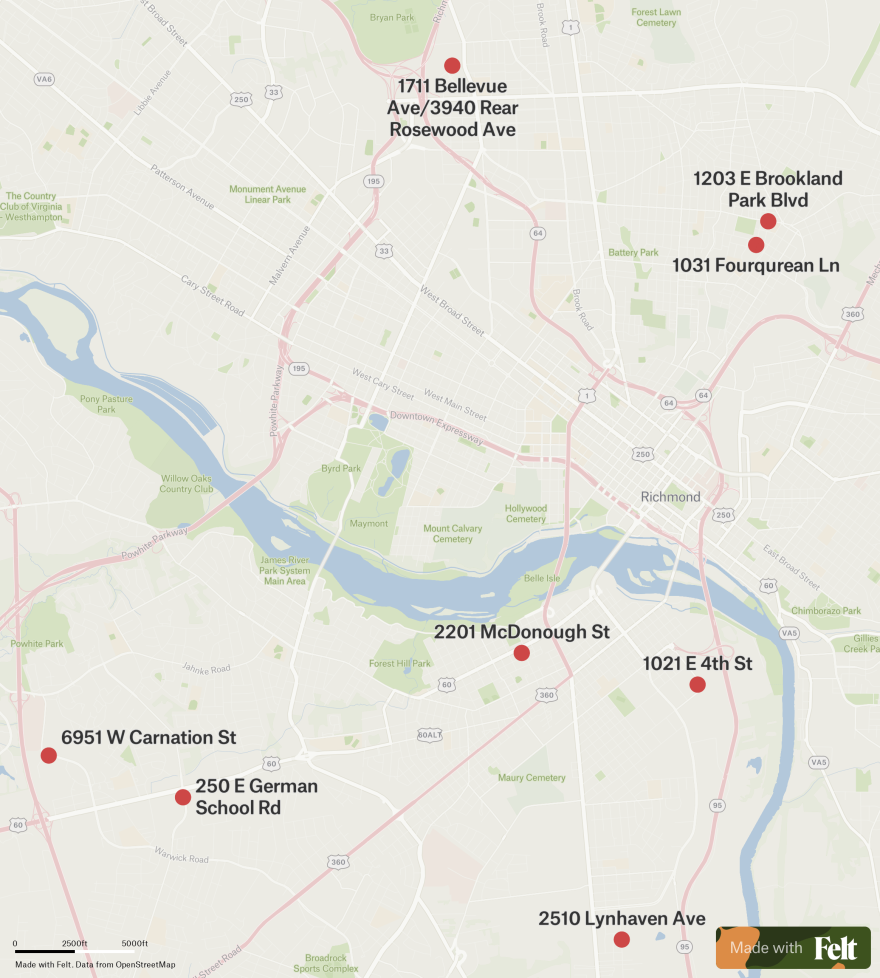Richmond City Council unanimously approved a resolution Monday night declaring evictions without legal representation a “public crisis” and offering support for programs that would provide tenants the right to counsel in eviction proceedings.
The resolution cites research from the RVA Eviction Lab at Virginia Commonwealth University, which found that tenants who face eviction in the city of Richmond and Henrico and Chesterfield counties were nearly eight times as likely to receive favorable outcomes with legal representation.
In a study on the right to counsel in Richmond, RVA Eviction Lab estimated that evictions and involuntary displacement cost the city $35 million a year — and that every dollar spent on providing tenants counsel would save $2 in cost.
“The most effective way to keep tenants stably housed is providing them an attorney in an eviction case,” Martin Wegbreit, who retired earlier this year as director of litigation at the Central Virginia Legal Aid Society, said Monday.
David Tisel, a pro bono fellow at CVLAS, invited councilors to attend Richmond General District Court to observe what happens when tenants don’t have legal representation.
“Every day, dozens of people receive eviction judgments against them without a real opportunity to present a legal defense — and often without even knowing what has happened,” he said.
Claire Moore, a nurse at VCU Health, emphasized the effect of evictions and homelessness on people’s health.
“Patients are coming in with completely preventable exacerbations of their chronic illnesses,” she said. “If any of us did not have a place to sleep at night, there’s no way that we would be concerned about our blood pressure medications or our sugars.”
“The fact that we frequently have to discharge people back to the streets is one of the greatest shames of my life,” she added.
The city’s current fiscal 2025 budget includes $500,000 for a right-to-counsel pilot program, which Councilor Andreas Addison said would be spent “very quickly.” In a report shared with the city, CVLAS estimated the cost of providing counsel in all eviction cases filed in the city during one year at approximately $9.3 million.
Affordable housing grants
Housing was a key topic throughout the meeting. Council also signed off Monday on a package of grants that would support the development of more than 1,000 new affordable housing units in the city.
The grants incentivize developers to build affordable housing units by paying back a portion of the incremental real estate tax revenue generated by the new properties. In order to receive the grants, developers commit to using minority-owned businesses during the construction process, making capital improvements during the first 15 years after construction is completed, and keeping units affordable at 60% of area median income (AMI) for 30 years.
Seven development projects across Richmond were approved unanimously as part of council’s consent agenda:

- 78 units at 1711 East Bellevue Avenue, developed by Surber Development and Consulting of Bristol
- 127 units at 1021 East Fourth Street, developed by Richmond-based Lynx Ventures as the final phase of the New Manchester Flats complex
- 56 units across 15 buildings at 1031 Fourqurean Lane, developed by Commonwealth Catholic Charities
- 43 units at 1201 East Brookland Park Boulevard, developed by Enterprise Community Development Inc. of Baltimore
- 50 units at 2510 Lynhaven Avenue, developed by Surber Development and Consulting in partnership with the Richmond YWCA
- 236 units at 250 East German School Road, developed by Standard Development Partners LLC, a company registered in Hanover County
- 151 units at 6951 West Carnation Street, developed by a Richmond-based LLC affiliated with Lynx Ventures
An eighth grant — for a three-building complex at 2201 McDonough St. with up to 266 units — was approved by an 8–1 vote, along with a zoning permit to allow the multifamily development. That project is being helmed by the affordable housing arm of Elmington, a Nashville-based real estate developer.
A group of Swansboro residents spoke in opposition to the development, largely due to concerns over whether the project offers appropriate access to Semmes Avenue from the complex, which is situated at the bottom of an incline. Planning documents filed with the city indicate that the street would only be directly accessible on foot by a steep staircase.
Pippa Holloway, a University of Richmond history professor who lives in the Southside neighborhood, said the developers told neighborhood residents they expected tenants with mobility difficulties would most likely use their own vehicles to get around.
Her response echoed a comment she sent to the city’s planning commission by email in July: “I don’t know what planet they’re from.”
Preston Lloyd, an attorney representing Elmington, said in response to questions from councilors that the company would be open to a development agreement with the city that would incorporate improvements requested by the community in a recent meeting.
As part of that agreement, he said, Elmington would be willing to explore whether allowing greater access to Semmes Avenue would be feasible.
Councilor Stephanie Lynch, whose district includes the site of the proposed development, voted against the permit and grant, saying that she couldn’t move forward with the proposal before those improvements had been officially codified.
Two proposals regarding the city’s real estate tax rate — one to keep the rate at $1.20 per $100 of assessed value, one to lower it to $1.16 per $100 — were postponed until next month. The council’s finance committee moved its next meeting up from Oct. 17 to Oct. 10 in order to present a tax rate recommendation before the full council meets Oct. 15.



